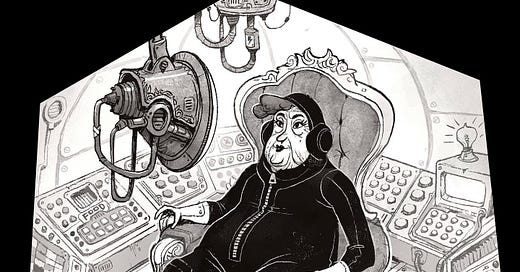“We created the Machine, to do our will, but we cannot make it do our will now. It has robbed us of the sense of space and of the sense of touch, it has blurred every human relation and narrowed down love to a carnal act, it has paralyzed our bodies and our wills, and now it compels us to worship it.”
— E.M. Forster, “The Machine Stops”
Dopamine addiction has been a contentious topic over the past few years.
With the rise of the internet and social media, suddenly everyone’s a neuroscience expert.
Mention that you're struggling with screen time, and you'll get a swift diagnosis: “doPaMIne aDdiCTioN.” Hell, dopamine is the new D-word, taking over whatever D-word was trending before.
It's easy to blame our body's cravings for our own inadequacies, we all do it.
But I’m not here to dwell on that. What I want to talk about is something else: boredom.
In a world saturated with overstimulation and endless flashes of color, it’s wild how many people are still overwhelmed by boredom and a lack of motivation.
But (in my humble opinion), this isn’t the usual kind of boredom. It’s a deeper void, one that tech can’t fill. It’s the absence of human connection.
The Hive Mind is Waking UP
The other day I saw an ad for an event. No phones allowed. No music. Just food, board games, drinks, and people.
First time I’ve seen that kind of thing. It sounded like a detox retreat disguised as a party.
The tickets were expensive. Still sold out.
You’ve got to be really bored to spend money on something like that.
And yet, maybe that’s exactly what people are doing. Trying to find something real again.
As humans, we have this strange trait—if you zoom out far enough, we operate like a single organism.
This looks like a mega hive mind trying to self-regulate.
We've reached a collective realization: tech, for all its brilliance, isn’t meant to be everywhere.
It should hide in the seams. Disappear into the background. Not steal the spotlight.
The Case for Unovation
Lately, I’ve been thinking about the future, how it should look.
I think we should embrace something I’m calling unovation: the evil twin of innovation… but not really.
I see it as a form of progress where technology becomes so seamlessly embedded in our lives, it becomes invisible.
Tiny devices instead of 7-inch phones.
Wires underground.
Trains replacing cars.
Screens disappearing from dashboards.
TVs that look like paintings.
Appliances that vanish into cabinets.
Tools that do their job and get out of the way.
Tech would merge into architecture and natural materials, dissolving into the living space.
Most people picture the future as a dystopian Blade Runner sprawl.
I imagine something different: a future where technology is so advanced it hugs nature, because really, nature is just hyper-advanced tech.
And unovation isn’t a new concept. Companies like Whoop make smart bands that track your vitals, no screens involved.
Bugatti and Pagani are phasing out screens in their latest cars altogether.
Tech that blends in is gaining traction. Look at Samsung’s “The Frame” a TV that looks like a painting when it’s off.
Or fridges designed with wooden panels to vanish into kitchen cabinetry.
Even I’ve found myself reaching for pen and paper more often lately.
Of course, that’s made possible by the fact that I can just narrate what I wrote to ChatGPT and get a soft copy in seconds, no need to manually transcribe it all.
A few years ago, this vision might’ve belonged in a sci-fi novel—nowhere near the "top ten future predictions" list.
But things have shifted.
With the AI boom, microchips getting even more micro, and society waking up to the importance of human interaction, the future is starting to look a lot more grounded.
We're realizing that connection shouldn’t be an afterthought, it should be at the center of how we move forward.
The last 50 years were about innovation, building tech that made work easier.
The next 50? I think they’ll be about unovation: building tech that disappears and makes life easier.





Human connection is the only thing that can never change
It's true nobody saw or even guessed what the emergence of AI would do
Now we are deep In it
Just like you can't stop thinking of the future,
I keep wondering what the coming years has in-store for humanity
Time will tell